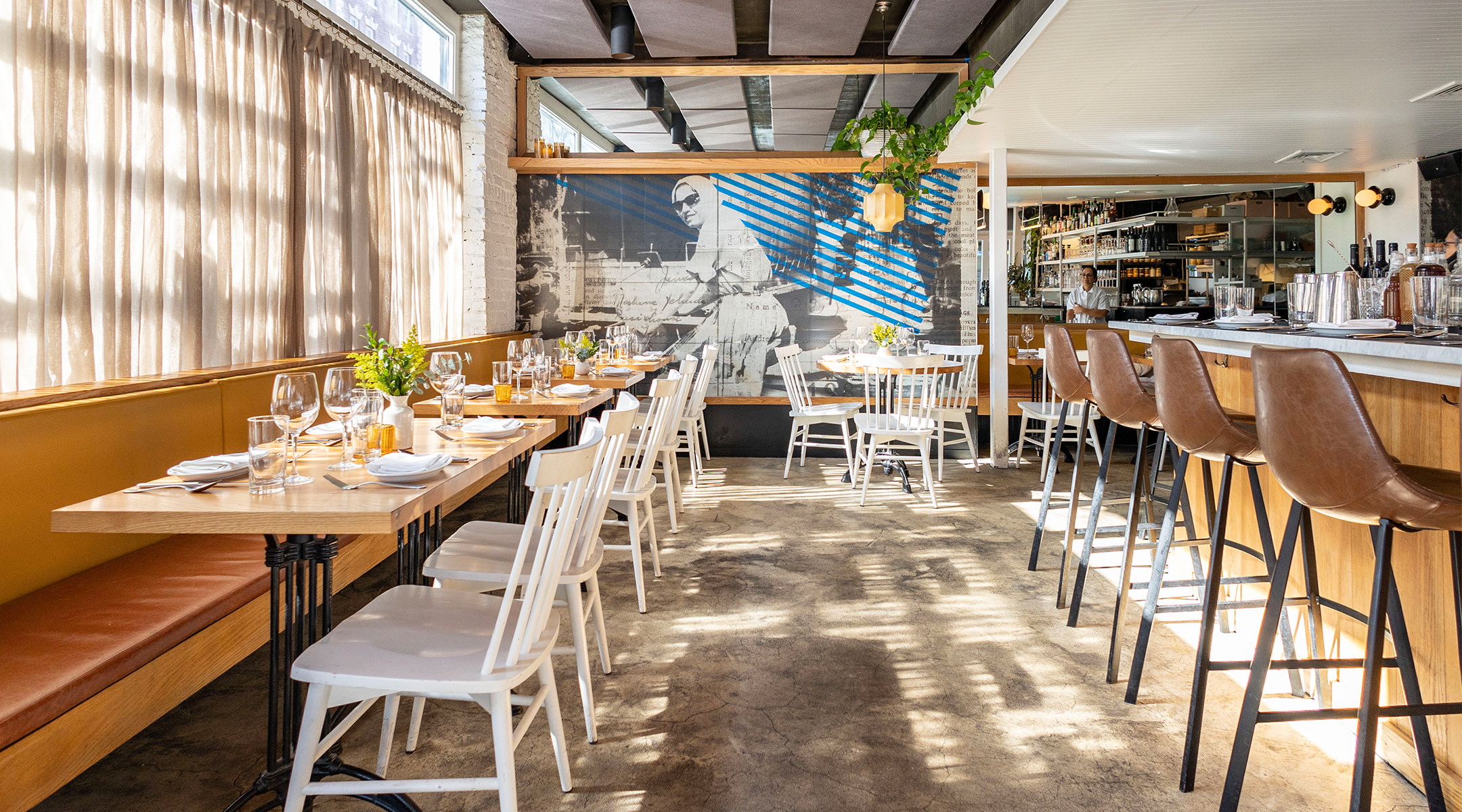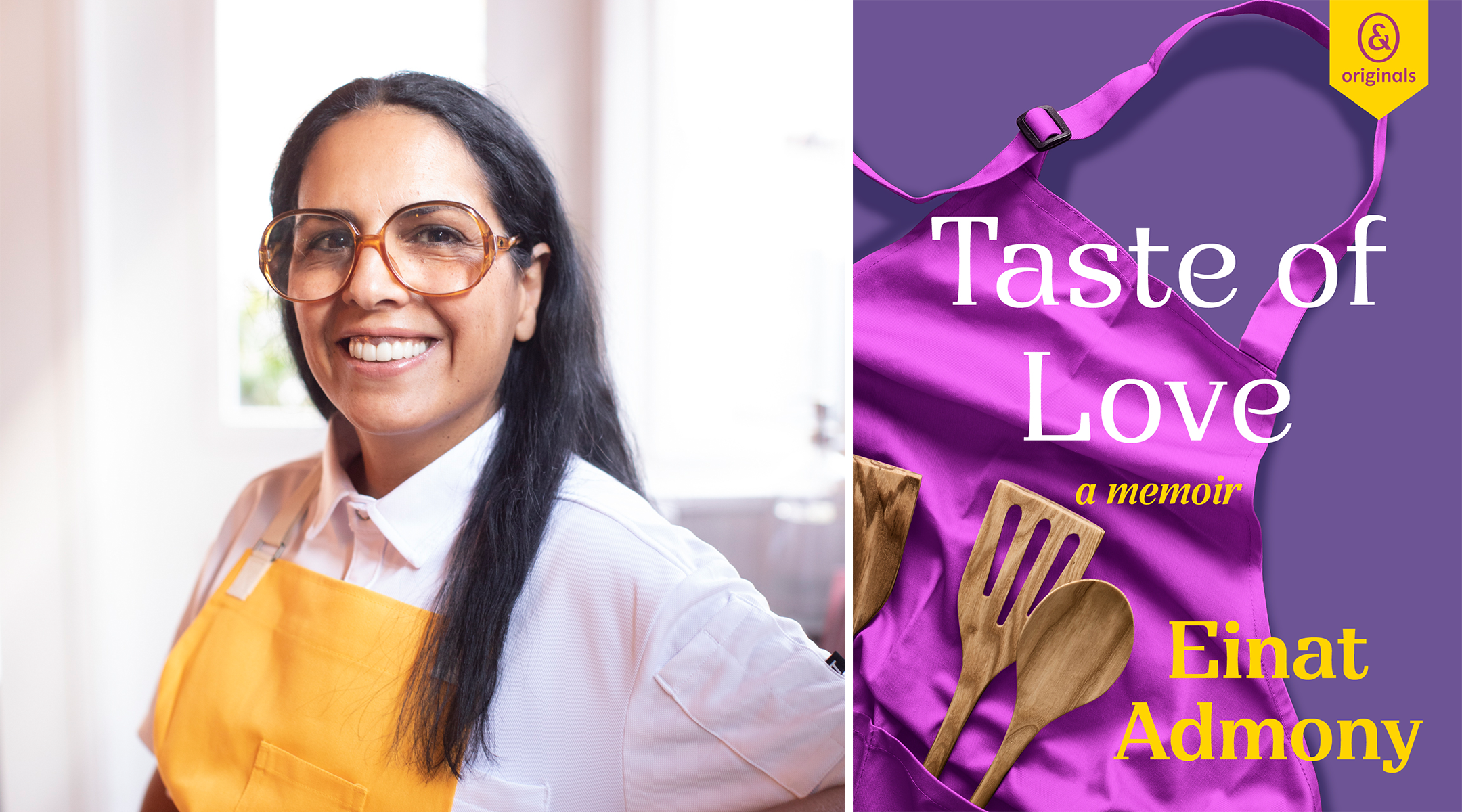“I was thirty when my first husband, Oren, walked out on me.”
So begins Israeli Chef Einat Admony’s fast-paced and often racy new mini-memoir, “Taste of Love.” The slim, 78-page tome — which is also available as an audio book, narrated by Admony — chronicles the award-winning New York-based chef’s love life, the early years of her cooking career and the intersection between the two.
Best known in this country as the founder of fast-casual falafel chain Taïm, as well as the owner-operator of acclaimed New York restaurant Balaboosta, Admony has been a winning contestant and a judge on the Food Network’s cooking competition show, “Chopped.” She previously wrote two cookbooks, “Shuk: From Market to Table, the Heart of Israeli Home Cooking,” with Janna Gur, and “Balaboosta”; this is her first memoir.
“I have a lot of crazy stories,” Admony tells the New York Jewish Week, as she sat with a reporter at Balaboosta over a cup of black coffee. “This is just a glimpse.”
Admony, 53, has been cooking her whole life, first alongside her observant Jewish mother, then during her compulsory service in the Israel Defense Forces. After two years in the army, Admony traveled through Europe and aimlessly returned to Israel in 1996 with, she wrote, “nothing but a thousand ecstasy pills sewn into the lining of my backpack and a gram of homemade hashish in my underwear.”
She realized that the only thing that could “distract my wild personality” was cooking, so Admony enrolled in culinary school in Israel. Upon graduation, she convinced acclaimed Tel Aviv chef Haim Cohen to hire her for his Mediterranean restaurant, Keren; there, she worked 13-hour days, climbed the culinary ladder and met Oren (not his real name), the man she would eventually marry and divorce.
Admony’s memoir zig-zags between Israel and the United States, first to help Oren achieve his dream of becoming, in Admony’s words, a “world-renowned chef.” Since he didn’t speak English, Admony became his spokesperson, knocking on doors to get him a job, first in Florida, then in New York where he was hired by master chef Daniel Boulud. Once he was settled professionally, she found work for herself at Bolo, Bobby Flay’s Gramercy Park restaurant.
The couple eventually returned to Israel and married in September 2001 — a union that lasted only four months. After he moved out, Admony returned to New York, with aims to reconnect with her two siblings, who were now living in the States, and with a French man, Stefan Nafziger, whom she had met a year earlier at a party in Alphabet City.
Nafziger and Admony had an immediate connection, and Admony acted on it on this return trip to the States. The couple married in 2003; and today they are business partners and share two children, Mika, 15, and Liam, 18. They have lived together in Fort Greene, Brooklyn, for more than 20 years. We spoke with Admony about her life in New York, the Israeli foods she introduced to this country, what sets her falafel apart, her pride in being Israeli, and more.
The interview has been lightly condensed and edited for clarity.
Your mom is Persian and was raised by an Iraqi foster family. Your dad was Yemenite. Why did you name your first restaurant Balaboosta, which is Yiddish for “perfect housewife”?
The difference between America and Israel is that [in Israel] it’s all one big family. I didn’t know balaboosta was an Ashkenazi word! Until two old, old women came the second day I opened Balaboosta and they wanted gefilte fish. I said, “Whaaaaat?” They said, “You called it Balaboosta, we expected grandma food!” I said, “Yeah. My grandma!”
I didn’t know it’s Yiddish. [The restaurant, like its name] always feels like home. This is the place a lot of people come for a first date or to meet the parents-in-law. The food was a mix of a lot of different things. Home food. I have some Ashkenazi food, like matzah balls with good flavor of fenugreek leaves.
In my building growing up in [the religious neighborhood of] Bnei Brak, one neighbor, a second mother to me, was Moroccan. Everybody else was Holocaust survivors. All Ashkenazi. My mom speaks a little Yiddish, which is funny. Sometimes a neighbor will bring gefilte fish and force my father to eat it. He would go to the fridge, take his schug [Yemenite hot sauce] not to hurt anyone’s [feelings].

The interior of Balaboosta, Einat Admony’s acclaimed Greenwich Village restaurant. (Peter Bonacci)
Which foods are you known for having brought to New York?
Sabich. There was always falafel but sabich [a fried eggplant sandwich with egg, vegetables, and more] you wouldn’t see. The one time I saw sabich was at Taboon [the Hell’s Kitchen restaurant]; he did it on focaccia, something fancy. But nobody did a fast-casual sabich in town. I was the first one who did a sabich sandwich like it was out of Israel.
Taïm first opened in the West Village in 2005 to great acclaim. What set your falafel apart?
Its freshness — it was fried to order. The falafel was small balls so you would have enough crispiness, you could crush them and inside it is still moist. I had a dash of mint inside. Nobody put mint inside falafel before. And most important is to not have baking soda, baking powder or flour. Most people put leftover bread. It’s already cheap; I don’t see a reason why you have to cut it with leftover bread. And from the beginning I didn’t want it to have gluten. My first boyfriend had celiac so it was very in my head that if you can cut out flour, why not.
You live in Fort Greene. Why is this Brooklyn neighborhood right for you?
I found an apartment I can never leave. I have lived in Fort Greene for 20-something years now. I liked this neighborhood when I got here. I was very poor and it was mixed racial, professional, no kids, no dogs, no cars. It was perfect. Now I have two cars, two kids aged 18 and 15 and one dog.
Do you belong to a synagogue there?
Yes, yes! Chabad of Fort Greene. I love Rabbi Zali [Abramowitz]. He’s a very good friend. My son is always the last person to complete a minyan [for Rabbi Zali]. When Zali calls him right before Shabbat and says can you come tomorrow, if he’s around, he will always go.
When you are not cooking at Balaboosta or not making one of your many famous big meals at home, where do you eat?
In Fort Greene, we eat at Evelina a lot. Thai Diner is my favorite restaurant in New York. I like the Khao Soi, a curry with chicken leg, crispy noodles, lots of basil and herbs.
You are always changing things up.
I’m still with the same husband for 21 years.
You founded Taïm, Balaboosta, you did stand up comedy. Are you still doing it?
A little. I’m trying to see if I want to get back to it.
And now you have a book. Why did you decide to do a mini memoir?
It’s a good story and I want to tell it. It’s all about who I am writing it with.
You wrote this with Joel Chasnoff, who is your sister’s husband as well as a stand-up comedian and author, with whom you wrote your first cookbook, “Balaboosta.” I guess you feel comfortable with him.
He’s very different [from me] but at the end of the day, with all the difficulties to work with your brother-in-law — we have fights, we always have fights — we make peace. It’s tricky because I’m very close to my sister. We are very open with each other and we get along very well and I respect him a lot. I don’t think there is anyone else who can capture my voice as much as Joel can.
Why is it such a short memoir?
It’s what Everand [the publisher] asked of me. I have a lot of crazy stories. This is just a glimpse.
So it’s possible there will be more. What are you hoping to achieve with this book?
In one way, it is very scary that people would know so much about me. I have friends that don’t know half [of the] shit I wrote there. Close friends know. I’m a very open book. It was liberating, almost almost. Working on it I found it was [like] psychoanalysis, like therapy.
Any other plans to do something outside of your comfort zone?
I am opening a HiFi listening bar, Moondog, in Bushwick this fall with my brother, Elon Admony. We have a gorgeous outdoor space and the food will be “Mexiterranean,” Middle Eastern tacos.
I want to do TV. That’s next. My own show. Fun stuff. I have a show called “Balaboosta” that we are working on. It is tricky. Israeli now is tricky.
How has the war between Israel and Gaza impacted your business?
It hasn’t impacted our business — we are busy. We are doing good. A lot of people only eat in Israeli restaurants since Oct. 7, people that never thought they are going to feel that way. I just feel like — I have an agent, and every once in a while he asks about a new job and I say, “Yes I will do it.” And then he comes back and he says not happening. And I’m always asking myself, “Is it not happening because something went down? Or it’s not happening because they realize I’m Israeli?” I want to believe it has nothing to do with that, but…
Do you get any pushback about cooking Israeli food, like people saying you are appropriating other people’s culinary traditions?
Of course. For years. My answer is in my Comedy Cellar sketch when I said that my mom is from Iran and my dad is from Yemen and according to Ancestry.com I f–king bleed hummus. [I am] 98% Middle Eastern.
Do you have wisdom to share with readers of the New York Jewish Week?
People should not hide. My mom’s name is Ziona — I always try to explain to people that the name is because her family and grandparents, for years, were dreaming about getting to the Holy Land. That was the dream. Not America for them — it was Israel. They want to be back home where there was the Kotel, where the Temple was, where the [Jewish] people are, the land.
The New York Jewish Week brings you the stories behind the headlines, keeping you connected to Jewish life in New York. Help sustain the reporting you trust by donating today.





